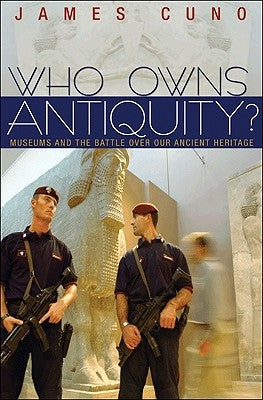Princeton University Press
Who Owns Antiquity?: Museums and the Battle Over Our Ancient Heritage
Who Owns Antiquity?: Museums and the Battle Over Our Ancient Heritage
Couldn't load pickup availability
Whether antiquities should be returned to the countries where they were found is one of the most urgent and controversial issues in the art world today, and it has pitted museums, private collectors, and dealers against source countries, archaeologists, and academics. Maintaining that the acquisition of undocumented antiquities by museums encourages the looting of archaeological sites, countries such as Italy, Greece, Egypt, Turkey, and China have claimed ancient artifacts as state property, called for their return from museums around the world, and passed laws against their future export. But in Who Owns Antiquity?, one of the world's leading museum directors vigorously challenges this nationalistic position, arguing that it is damaging and often disingenuous. "Antiquities," James Cuno argues, "are the cultural property of all humankind," "evidence of the world's ancient past and not that of a particular modern nation. They comprise antiquity, and antiquity knows no borders."
Cuno argues that nationalistic retention and reclamation policies impede common access to this common heritage and encourage a dubious and dangerous politicization of antiquities--and of culture itself. Antiquities need to be protected from looting but also from nationalistic identity politics. To do this, Cuno calls for measures to broaden rather than restrict international access to antiquities. He advocates restoration of the system under which source countries would share newly discovered artifacts in exchange for archaeological help, and he argues that museums should again be allowed reasonable ways to acquire undocumented antiquities. Cuno explains how partage broadened access to our ancient heritage and helped create national museums in Cairo, Baghdad, and Kabul. The first extended defense of the side of museums in the struggle over antiquities, Who Owns Antiquity? is sure to be as important as it is controversial.Author: James Cuno
Publisher: Princeton University Press
Published: 11/07/2010
Pages: 288
Binding Type: Paperback
Weight: 0.90lbs
Size: 9.10h x 6.10w x 0.70d
ISBN: 9780691148106
About the Author
James Cuno is president and director of the Art Institute of Chicago and former director of the Courtauld Institute of Art and the Harvard University Art Museums. He has written widely on museums and cultural policy. His books include Whose Muse?: Art Museums and the Public's Trust (Princeton).
Share


